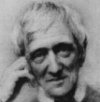
Principle 9. Problem TextsProblems will always remain. But once we have gained insight into their nature they need never upset us.
|
Interpreting Scripture correctlyLESSON Nine
|
||
A thousand problems do not make one doubtImagine that one fine morning you were to find a policeman next to your bed, charging you with bank robbery and murder! He tells you that the night before you have been seen entering the bank in question. A handkerchief that was left on the place of the crime bears your initials. Bloodstains are found on your shoes. Everything seems to point to you being responsible. Yet you know it is not true. There are plenty of problems and riddles that need to be solved, but in your mind there is no doubt regarding your position : you know you are innocent. This example illustrates an important theological maxim which we owe to Cardinal Newman. "A thousand problems", he said, "do not make one doubt!" If you know yourself to be innocent, no amount of conflicting evidence will make you doubt it. If you have established a truth of faith, no number of difficulties will unsettle that conviction. The reason for this lies in the nature of the problems: they do not affect the fundamental certainty that you have acquired independently of these problems. Suppose you have an electric table lamp and you see it is on. There may be reasons to be surprised at this fact: there is a general blackout in the house; the bulb burst just the day before and was not replaced; nobody switched on the table lamp etc. etc. In short, according to all evidence your table lamp could not possibly be giving light. Yet in spite of these problems you cannot doubt the fact that it does burn, simply because—independent of all these difficulties—you see that it burns. In this sense a thousand difficulties cannot make one doubt. Your doubt would start if you notice that, perhaps, there is some flaw in your faculty of seeing. You might not have looked properly or you might have taken a mere reflection for actual direct light. But in that case the doubt proceeds from an uncertainty in your very reason for accepting the fact. |
Cardinal John Henry Newman |
||
The nature of ScriptureOur problems regarding sacred scripture usually are of the same nature. They should in no way unsettle our faith in the inspired character of the books. New difficulties will always crop up. Archaeology, history, comparative religion may at any time produce new instances of apparent contradictions, inaccuracies and problematic teachings. Such findings may puzzle us. They may confront us with unexpected enigmas. Yet, they should never induce us to doubt what we know from other independent sources to be absolutely true: that Scripture was inspired and that it contains God's inerrant message for humankind! Our difficulty in understanding the Bible well, derives basically from human complexity, a complexity which is reflected in human language. The fundamental rule of understanding human speech could be formulated in this way: no human word can be interpreted loose from the complex situation in which it is spoken. Notice: 'warm'. In Western contexts the picture evoked is one of a hearty and friendly reception. In these countries warmth -a lovely sunny day, a snug winter mantle, the hearth of the living room - carries with it a wide connotation of friendliness, safety and happiness. In a country such as India precisely the opposite - coolness - conveys the same notion of friendliness, safety and happiness: the cool shade of a tree, an ice-cold drink, a refreshing bath, the comfortable coolness of the evening. "Peter gave his father a warm welcome" is an idiomatic expression that could be used in the East, but then, perhaps, with a meaning that is not complementary for Peter! The "warm welcome" of the West corresponds to the "cool welcome" of the East. Judging the value of such a statement requires penetration into the complex human situation in which the statement was made. This is how Jesus describes how a loving father welcomes his lost son:
The picture works well in Palestine, but - years ago - when I read this text to a group of students in Andhra Pradesh, India, some were disturbed by it. "The idea of killing a calf and eating it, positively revolts me", a girl told me. Many Indians are vegetarians. In Andhra Pradesh even people who eat chicken will never eat veal. Hindus consider killing a cow (known as 'go hatya') a serious crime. Did Jesus want to upset these people? No human word - including Scripture which uses human words - can be interpreted loose from the complex situation in which it is spoken. This applies also to Scripture which uses human words. And since we do not fully know the original context, there will always be texts that will puzzle us. |
|
||
Patience
There is another thought that should prevent us from panic about Scripture problems. Eighty years ago some Christian scholars, among them a prominent Belgian scripture scholar, lost their faith because they could not square evolution with the six-day creation account in Genesis. They left the Church in panic. They were haunted by the idea that the problem had to be solved there and then. They were convinced that they themselves had to work out the solution — that otherwise their faith would be without ground. As the light did not dawn on them soon enough, they gave up faith . . . Looking back we can truly say that they succumbed to very premature despair. Evolution and Genesis in no way contradict each other! Even children in our secondary schools easily understand how this apparent conflict can be solved. To have given up Christian faith for such a reason is like committing suicide for fear of an invasion from Mars! Remember our case study on six day creation. Note well: it is easy for us to judge now, because the problem has been solved. For them the matter seemed an insuperable problem. Their mistake consisted in thinking it altogether insuperable because they themselves could not solve it there and then. The lesson for us is to remember that problems need not be solved by each individual alone. Difficulties of that kind are met by the whole community of believers. And even if in a particular moment of time we fail to see a solution, we should be confident that the community of faith — guided by the Holy Spirit — will slowly, but surely meet the challenge. So far the Church has never succumbed to any problem. Neither will it do so in the future! |
|
||
Advice from the pastSaint Augustine (354-430 A. D.) also experienced problems when explaining sacred Scripture. Speaking about such difficulties he left us the following thoughtful testimony: "I believe most firmly that none of the sacred writers has fallen into any error! And if in these books I meet anything that seems contrary to truth, I shall not hesitate to conclude: Firm belief in revealed truth and trust in God's community of believers should preserve us from intellectual panic. And even more important is the humble admission of our own limited understanding! John Wijngaards |
|
||
Case Studies
|
|||
Go to the next lesson: Sacred Scripture is an example of the divine working through human means. |
course overview | ||
CreditsThe texts in our course Interpreting Scripture Correctly were written by John Wijngaards in 2009. Part of the contents is based on his earlier publications, in particular:
Illustrations in the video clip by Jackie Clackson. |
 |
 |
 |
 |
 |
|
|---|---|---|---|---|---|
| Facts |
 |
 |
 |
 |
|||